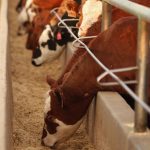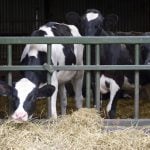A pan-Canadian research project will try to understand more about how methane is generated in the rumen of beef and dairy cattle.

$7.9 million cattle research project aims to find rumen efficiencies
Cross-Canada project to reduce methane production will be led by UBC researcher

Food companies launch partnership to cut dairy industry’s CO2 emissions
Food companies Ajinomoto and Danone unveiled on Thursday a partnership to reduce the dairy industry's greenhouse gas emissions using a feed additive called AjiPro®-L, which is purported to reduce nitrous oxide emissions from manure.

US targets nitrous oxide in new phase of climate strategy
The Biden administration on Tuesday announced it would seek to curb U.S. emissions of powerful industrial greenhouse gases such as nitrous oxide as it enters a new phase in the national strategy to fight climate change under the Paris agreement.

Semi-finalists announced in cattle methane reduction challenge
Thirteen semi-finalists were announced today in a federal challenge to come up with economically viable and scalable methane-reduction practices for beef and dairy cattle.

Denmark will be first to impose CO2 tax on livestock emissions, government says
Denmark, a major pork and dairy exporter, will introduce a tax on livestock carbon dioxide emissions from 2030, making it the first country to do so and hoping to inspire others to follow, the government said on Tuesday.

U.S. FDA clears methane-reducing feed additive Bovaer
The U.S. Food and Drug Administration has cleared methane-reducing feed additive Bovaer for lactating dairy cows, Elanco Animal Health said yesterday.

Denmark bets on cow feed additive to reduce methane emissions
The Nordic country has pledged to reduce emissions by 70 per cent by 2030 compared to 1990 levels.
Denmark has agreed to help farmers finance a feed additive that is expected to reduce methane emissions from cattle by up to 30 per cent, as part of efforts to meet ambitious climate goals, its government said on Monday.

